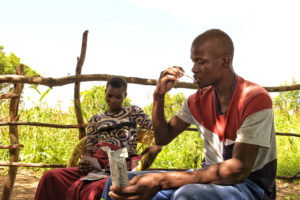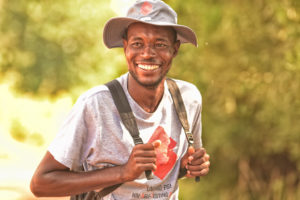This blog post is the second in a series of four on the HIV Self-Test AfRica (STAR) project, which works in Zimbabwe, Zambia and Malawi. The STAR team will be in Blantyre, Malawi, from June 27 to July 1, 2016 with PSI Global Ambassador Debra Messing to learn more about how HIV Self-Testing can contribute to achieving the UN’s 90-90-90 targets. The piece below shows how this is already happening in Zimbabwe. Follow @psiimpact to see what the team is doing during this week.
As the mid-day sun shines brightly in Chitiyo village, 33-year-old Zimbabwean Harrison Gwaze is a man on a mission. Harrison is armed with a valuable arsenal: HIV self-testing kits that take only 20 minutes to provide results.
Today, the tall Zimbabwean is meeting 33-year-old Weston Kandawasvika and his pregnant wife, 27-year-old Patience Mbeve, to encourage them to take an HIV self-test.
He is one of 80 community distributors that form the veritable backbone of a $23 million initiative funded by UNITAID to kick-start self-testing and reach people living in rural areas. They are tasked with the job of taking self-test kits to people in the security of their homes, counselling them about HIV, encouraging them to take the test, and linking them with treatment or prevention services. Through the initiative PSI and its partners will distribute over 350,000 tests in Zimbabwe alone to understand the best ways to deliver the kits.
Helping others with HIV self-testing

Weston Kandawasvika takes an HIV self test (Image: Eric Gauss/UNITAID)
After pleasantries, Harrison gets to work under the welcoming shade of a Musasa tree, explaining the benefits of taking an HIV self-test. “I tell them to go for HIV testing earlier than later. Being HIV positive doesn’t mean the end of the world. It’s better to be on treatment early. It is a new beginning,” says Harrison.
Once Weston agrees to take the test, Harrison takes out a poster with pictures to explain how he should go about it. Weston takes a swab from his mouth, and they wait 20 minutes for the results. “I was actually surprised that that they don’t have to do a blood test and that the HIV self-test can be completed so quickly,” says Weston who lives in a country that has almost 15 per cent HIV prevalence and almost every household has been affected by the disease.
“Many people are scared to take the test but it’s my job to tell them not to be fearful, as getting tested means that they can get on treatment early, and live long and healthy lives,” says Harrison.
While Weston waits, Harrison is furiously taking down data in a tablet. All distributors carry tablets to gather data that is transferred to a central server. Programmers then monitor the quality of the data and provide feedback to the distributors.
There is a visible sigh of relief when Weston tests negative. Even then, Harrison urges him to get a circumcision as that can prevent HIV. Patience, who is several months pregnant, has already tested six months ago at the antenatal clinic, which is many kilometres away. She wants to take the test later in the privacy of her own home.
Confidentiality is a critical element of HIV self-testing, so Harrison smiles and gives her the kit, and requests her to drop off the sealed test results in a drop box outside Harrison’s home.
Bringing testing to young men in rural areas
Young men have been left out of traditional testing services as they are reluctant to go to clinics. “People have to walk long distances to reach testing centres and wait a long time to get tested for HIV,” says Dr. Owen Mugurungi, Director, AIDS and TB Unit, Ministry of Health and Child Care, Zimbabwe. “That is why HIV self-testing is a game-changer. When people test themselves, they know their HIV status and then take can action. It helps to put control within the hands of people.”
A discreet community distributor

Harrison distributes HIV self-test kits in rural Zimbabwe (Image: Eric Gauss/UNITAID)
Respecting privacy and being discreet are crucial qualities for community-based distributors who are handpicked by local authorities. “I was selected because I am friendly, the villagers can trust me, and tell me their secrets,” says Harrison, who can easily win over a tough critic with his warm smile and gentle demeanour.
This sentiment is echoed by Brighton Muzhira, the local government councillor.“The distributors are well-known in the village. That is why the villagers are accepting and supporting the initiative,” he says. “It is great to see the way the communities are taking the program forward.”
It started a few weeks ago when the village headman introduced Harrison during a village meeting and encouraged him to speak about the self-testing program. Once the meeting finished, Harrison was bombarded with requests for kits. “So I started going door-to-door to meet them. The introduction by the village head opened up everything. Even though the program is new, the community has been very receptive,” remembers Harrison.
Due to the overwhelming response, Harrison has already had to request more kits. Even Harrison was surprised as he did expect challenges. “There is a special religious sect in my village that doesn’t like to go to hospitals. But I did not face any resistance from them. Here we have only one clinic which is very far, so self-testing is ideal as it saves time and offers privacy,” he says.
Thanks to Harrison’s example, Weston also wants to become a community-based distributor. “I think they are many people who are in need, and who have never tested before,” says Weston. “They could use these services.”
Over the next three years, this project will test the ways to maximize the potential for HIV self-testing to bring testing to millions of people living in rural areas of Africa. “If we empower people to take control, we can end the epidemic,” says Dr. Mugurungi.
For more images from this project, check out “A day in the life” on UNITAID’s Flickr stream